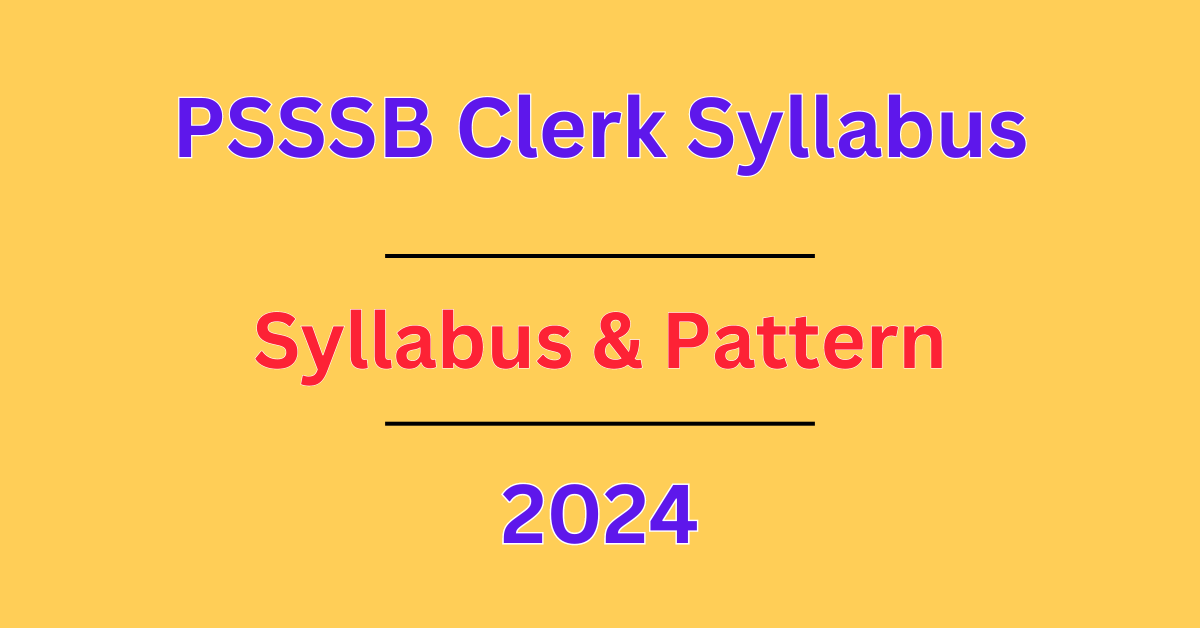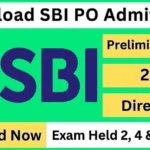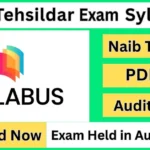PSSSB Clerk Syllabus: The Punjab Subordinate Services Selection Board (PSSSB) conducts the Clerk Examination to recruit Candidates for clerical positions in different departments of the Punjab Government. Check the detailed syllabus and pattern of the clerical post. We provide all the details about the PSSSB Clerk Examination so you can prepare for the examination deeply. Below is a comprehensive guide for Exam Preparation.
1. General Knowledge (GK)
General knowledge is based on current events and knowledge of basic facts about the world, especially India and Punjab.
- Punjab GK: History, culture, economy, political scenario, and demographics of Punjab.
- General Science: Physics, Chemistry, Biology, and Environmental Science.
- Economy: Basic economic concepts, budgeting, banking, finance, Planning, and economic development, especially in Punjab.
- Indian Polity and Constitution: Basic Structure, features, and functions of the Constitution, Panchayati Raj, governance, and administrative systems.
- Geography: Physical, economic, and social geography of India and Punjab, as well as important geographical landmarks.
- History: Indian History with special emphasis on the history of Punjab, freedom struggle, and major events.
- Current Affairs: National and International current events, awards, sports, books, and authors.
2. English Language
In this section, candidates can understand and use the English language effectively.
- Grammar: Tenses, prepositions, conjunctions, articles, voice (active/passive), narration (direct/indirect), subject-verb agreement.
- Vocabulary: Synonyms, antonyms, homonyms, one-word substitutions, idioms, and phrases.
- Comprehension: Reading passages with multiple choice questions (MCQs) to test understanding.
- Writing Skills: Sentence Correction, error spotting, para jumbles, and sentence arrangement.
3. Punjabi Language
In this section, check the candidate’s proficiency in Punjabi Language.
- Grammar: Tenses, verbs, nouns, adjectives, pronouns, prepositions, and conjunctions in Punjabi.
- Vocabulary: Synonyms, antonyms, idioms, and phrases.
- Comprehension: Reading passages with MCQs.
- Writing Skills: Error detection, sentence arrangement, and para jumbles in Punjabi.
4. Mental Ability/Reasoning
In this section, check the candidate’s mental ability by reasoning MCQs.
- Verbal Reasoning: Analogies, classification, coding-decoding, blood relations, series (numbers, letters), direction sense, and ranking.
- Non-Verbal Reasoning: Pattern recognition, mirror images, paper cutting, figure series, and grouping of identical figures.
- Logical Reasoning: Statements and assumptions, syllogisms, statements and conclusions, cause and effect, and course of action.
- Analytical Reasoning: Puzzles, seating arrangements, data sufficiency, and input-output reasoning.
5. Quantitative Aptitude/Numerical Ability
In this section, check the candidate’s proficiency in Maths subjects.
- Number System: Whole numbers, integers, fractions, and decimals.
- Arithmetic: Percentages, ratio and proportion, averages, simple and compound interest, profit and loss, time, speed and distance, and work and time.
- Algebra: Basic algebraic expressions, linear equations, and quadratic equations.
- Geometry: Properties of lines, angles, triangles, quadrilaterals, circles, and mensuration.
- Data Interpretation: Interpretation of data presented in tables, bar graphs, pie charts, and line graphs.
6. Computer Knowledge
In this section, check the candidate’s computer skills.
- Computer Fundamentals: History and generations of computers, types of computers, and basic concepts of hardware and software.
- Operating System: Basic knowledge of operating systems (Windows, Linux, etc.), functions, and features.
- MS Office: Proficiency in MS Word, MS Excel, MS PowerPoint, and MS Access.
- Internet & Email: Basic concepts of the internet, email usage, browsers, search engines, and networking.
- Cyber Security: Awareness of viruses, malware, firewalls, data protection, and online safety.
Preparation Tips
- Understand the Exam Pattern: Along with the syllabus, familiarize yourself with the exam pattern, marking scheme, and the weightage of each section.
- Create a Study Plan: Allocate time to each subject based on your strengths and weaknesses. Ensure you cover all topics systematically.
- Regular Revision: Consistent revision is key to retaining information, especially for static GK and formulas in quantitative aptitude.
- Practice Mock Tests: Solve previous years’ papers and take online mock tests to get accustomed to the exam environment and improve speed and accuracy.
- Focus on Weak Areas: Identify and work on your weak areas, whether it’s a particular subject or type of question.
- Stay Updated: Regularly follow current events, especially those related to Punjab, to score well in the GK section.
Conclusion
The PSSSB Clerk exam requires a well-rounded preparation strategy, encompassing a deep understanding of the syllabus and effective time management. By systematically covering each topic, revising regularly, and practicing extensively, you can significantly enhance your chances of clearing the exam.














